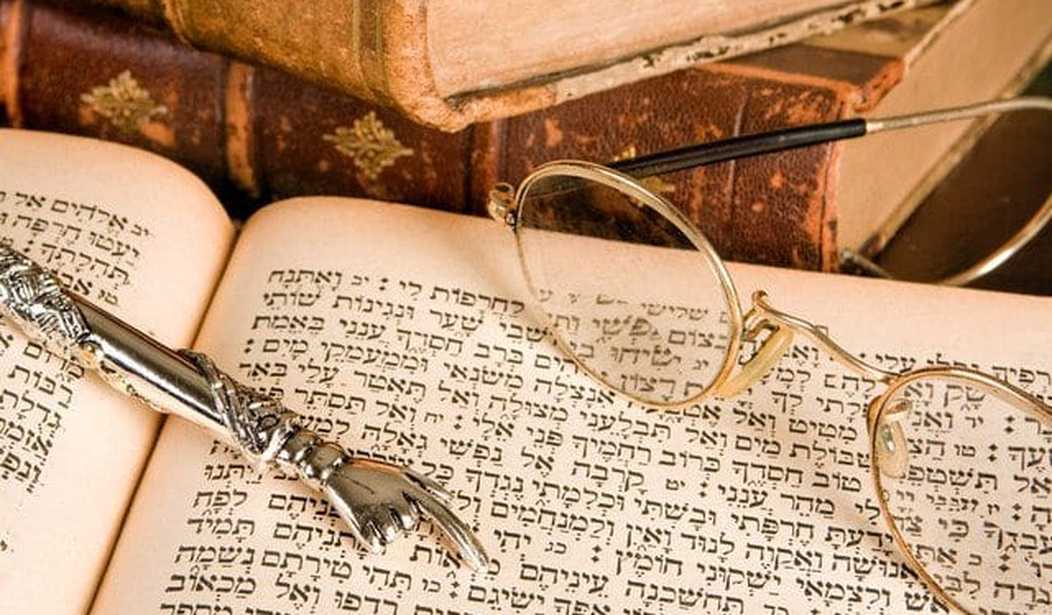We’re publishing a weekly series of articles covering each week’s Torah portion as a rabbi (such as the author) might do via a talk in a synagogue. The series is tailored so it may also be read by non-Jews who may be interested in how Jews read and interpret Scripture. Click here for the first article in the series.
——————————
Dëvar Torah — Parashath Dëvarim (Deuteronomy I, 1-III, 22)
With this week’s parasha we begin the fifth book of the Chumash, the five books of Moshe. In general, we call this book Séfer Dëvarim (“Words”) after the first substantive word in the book. The Rabbis in the Talmud had a different name for it, Mishné Torah (which here should be translated as something like “supplemental Torah”). This underlies the name by which it was called in the Septuagint, Deuteronomion, hence the English term Deuteronomy.
The Nëtziv, in the Ha ‘améq Davar’s introduction to the book (basing himself on Bëréshith Rabba VI), suggests a basis for this name on the grounds that “from this book it is possible to derive all sorts of mussar.” This word represents an elusive concept to render in English.
Derived from the root of the verb yasar (“correct, punish”), the word covers all aspects of ethical behavior. It has come to denote an entire genre of Judaism designed to assist the individual in correcting his character.
In form, the book comprises a long exhortatory given by Moshe as he took leave of Israel, who were about to begin the invasion of the Promised Land under the leadership of Yëhoshua bin Nun. As such, it serves as a “supplement” to the rest of the Torah in that much of it consists of his encouragement of Israel in their zeal for the life of Torah and its commandments. In particular, it covers the many “new” commandments, not yet practiced in the desert, which would take effect in the Holy Land.
If we read the first verse of the parasha carefully, something fairly leaps out at us: “Élle hadëvarim asher dibbér Moshe el kol Yisra’él bë‘éver haYardén bamidbar ba‘arava mol Suf bein Paran uvein Tofel vëLavan vaChatzéroth vëDi Zahav.” (“These are the words which Moshe spoke to all of Israel on the bank of the Jordan in the desert on the plain before Suf, between Paran and Tofel and Lavan and Chatzéroth and Di Zahav.”)
At first glance, it seems that we are being presented with an extremely precise geographical description of the venue of Moshe’s speech. It is only when we analyze the place-names that it becomes clear something is wrong.
“On the plain [of Mo’av] on the bank of the Jordan” is a fair description of Israel’s physical location at this time, but the ‘arava is not a desert. Further, what are we to make of Suf? The only location known by that name is Yam Suf, the “Sea of Reeds” which Israel crossed seven days after leaving Egypt where the Egyptian chariotry was drowned. Paran and Chatzéroth are place-names, but you will search the books of Exodus and Numbers in vain for Tofel, Lavan, or Di Zahav.
And how could Israel be “between” all these places? The verse cries out: “Interpret me!”
A perusal of the Targum Onqëlos, the standard Aramaic paraphrase, offers some guidance. “Bë ‘ivra dëYardëna,” writes Onqëlos, “ochch yathhon ‘al dëchavu bëmadbëra vë‘al dë’argizu bëmishra loqovel Yam Suf.” (“On the bank of the Jordan [Moshe] rebuked them because they had sinned in the desert and because they had provoked [G-d] on the plain before Yam Suf”).
Rashi explains their “sinning in the desert” as referring to Israel’s complaint of hunger in Exodus XVI, 2-3ff. This preceded the miraculous rain of manna from Heaven.
“Provoking G-d” before Yam Suf refers to their complaint to Moshe — “Weren’t there enough graves in Egypt?” — just before the splitting of the Sea (Exodus XIV, 11).
“BëFaran,” continues Onqëlos, “‘al dé’ittappalu ‘al manna, uvaChatzéroth dë’argizu ‘al bisra, vë‘al dë‘avadu égal didhav.” (“For Paran, because they attacked the man, and for Chatzéroth, because they provoked [G-d] over the meat, and because they worshipped a golden calf.”)
Here, Onqëlos follows the Sifrei in interpreting Tofel and Lavan as referring to “hadëvarim shetafëlu ‘al haman shehu lavan” (“the foolish words which they said about the man, which was white”), as reported in Numbers XXI, 5ff.
Finally, Onqëlos explains Di Zahav (“the golden one”) not as a place-name, but as a reference to the golden calf (Exodus XXXII).
The mussar aspect of Dëvarim, as defined by the Ha‘améq Davar, is thus clear from the start. It is a fair question to ask why, according to Onqëlos, Moshe singled out these particular occurrences. There were, after all, others in the course of the forty-year-long trek, as other commentaries point out.
But if we examine each of the above incidents, we can discern a common thread.
- The sin in the desert: “Would that we had died by Ha-Shem’s hand in the land of Egypt … ” (Ibid., XIV, 3).
- At Yam Suf: “Were there not graves in Egypt? … What have you done to us to bring us out of Egypt?” (Ibid., XIV, 11).
- The complaint about the man: “Why did you bring us up from Egypt?” (Numbers XXI, 5).
- The provocation of the meat: “We remember the fish that we used to eat in Egypt gratis … ” (Numbers XI, 5).
- The golden calf, which was made on the model of an Egyptian god (cf. ‘Avoda Zara 43a that the Egyptian god Serapis — a sacred bull — was the deification of Yoséf).
The common thread, of course, is the surrealistic nostalgia for Egypt expressed in each of the above incidents. How else to describe the “memory,” “when we sat at the meat-pot, when we ate our fill of bread?” (Exodus XVI, 3). Or that of the fish which we ate “gratis” and the “cucumbers, melons, leeks, onions, and garlic” in Egypt (Numbers XI, 5).
The stark reality is that they were tortured and starved in Egypt, driven to hard labor.
The matza which we eat on Passover is, in the Haggadah’s words, “lachma ‘anya dë’achalu avhathana bë’ar‘a dëMitzrayim” (“the poor bread which our forefathers ate in the land of Egypt.”) The maror, the bitter herbs, are a further reminder of that period; the salt water in which the eggs are dipped, a reminder of the tears which were shed.
Nothing was “gratis.” Everything was at the price of hard labor, of beatings and degradation. How could the very people whose backs had felt the Egyptian lash now imagine otherwise?
Egypt was the very soul of looseness and immorality. Rashi, commenting on Genesis XII, 19, tells us of the Egyptians “they were awash in evil purpose,” and cites Ezekiel XXIII, 20: “And the emission of a horse is their emission.” To this, the Mëtzudath David comments that Egyptian civilization was “the way of an utter harlot, the essence of abandonment to such cravings.”
This was the “freedom” of the Egyptians, that freedom of which the Talmud says “‘avda bëhefqeira neicha leih” (“the slave prefers ownerlessness”; Gittin 13a). But this “ownerlessness” is illusory. The reality is ‘avduth, the enslavement of one’s essential being to the petty lusts made possible in this world of lies.
Israel in Egypt had descended almost to the level of the Egyptians (cf. Ezekiel XX, 7-10 for a graphic description of this). Of the fifty levels of tum’a (“spiritual degradation”) of which the commentators speak, Israel had reached the forty-ninth. For this reason, G-d rescued them bëchippazon, “in haste” (as Deuteronomy XVI, 3 has it) more on the strength of His promise to the Patriarchs than on their personal merit.
Accordingly, Israel owes an eternal debt to G-d: “For they are My servants, whom I brought out of the land of Egypt”; Leviticus XXV, 42).
Moshe had to warn the new generation, and by extension all subsequent generations, of the power of self-deception. If the very people who had experienced the Egyptian captivity were capable of fooling themselves concerning its nature, how much more so the generation born in the desert, who knew it only by hearsay?
The coming conquest would be by way of nature; Ha-Shem’s hand, for the most part, would be behind the scenes. It would seem difficult, and Israel would have to remember where true freedom lies; in the words of the famous mishna, “Read not ‘engraved’ [Exodus XXXII, 16] but rather freedom.” (Avoth VI, 2 the pun is based on the fact that both charuth – “engraved” – and cheireuth – “freedom” – have the same spelling in Hebrew), “for no one is free save one who is occupied in Torah.”
Only in ‘avduth to Ha-Shem can we be free of ‘avduth Mitzrayim, a lesson for then and now from this week’s parasha.









Join the conversation as a VIP Member